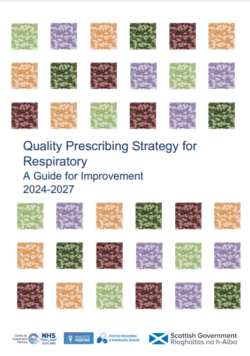The Scottish Government has published the updated Quality Prescribing Strategy for Respiratory: A Guide for Improvement 2024-2027 to support clinicians across the multidisciplinary team and people with respiratory conditions in shared decision-making and the effective use of medicines and inhalers for respiratory conditions.
The guide offers practical advice and options for tailoring treatment to the needs and preference of individuals.
Working together for person-centred care
The Scottish Government developed the updated guide in conjunction with experts from NHSScotland, academics and experts by experience.
The guide builds on the previous 2018-21 strategy to ensure appropriate prescribing of medicines to optimise treatment outcomes and achieve the best care for people with respiratory conditions.
Putting the person with respiratory conditions at the centre of their treatment, the guide focuses on delivery of person-centred care. It does this through:
- promoting safe, evidenced based, sustainable prescribing and maximising preventative treatment
- promoting regular reviews of medication to ensure their ongoing effectiveness, using the 7-Steps medicine review model
Better for patients, better for the environment
Prescribing is the most common intervention that is made in healthcare in the UK. Ensuring that prescribing is safe, effective, and appropriate is an essential part of sustainable prescribing and care.
Improved control of respiratory conditions will also lessen environmental impact by:
- reducing over-reliance on short-acting beta-2 agonist (SABA) reliever inhalers in asthma
- preventing exacerbations and admissions to hospital alongside unplanned contact with healthcare providers
Ultimately, this will lead to improved care and will contribute to NHSScotland’s net zero ambitions.

Further support for boards and GP practices
A suite of National Therapeutic Indicators (NTIs) aligned to the recommendations in the guidance have been developed. The suite of NTIs is available with open access through the Public Health Scotland (PHS) website and updated quarterly to enable boards and GP practices to benchmark and identify change.
Alongside the NTI indicators, we’ve developed a complimentary set of Scottish Therapeutics Utility (STU) case finding searches. STU is available in all GP practices in Scotland and the searches will enable practices to identify patients at risk of harm for review.
Quality prescribing guides
All the quality prescribing guides now consider the sustainability of prescribing. They also focus on person-centred care to achieve better outcomes for people – this includes considering non-pharmaceutical options, for example, encouraging activity and healthy lifestyle, as well as medicines where these are appropriate.
The quality prescribing guide for type 2 diabetes was published in January this year and other guides due to be published shortly include the Antidepressants and the Benzodiazepine and Z-drug guides. The polypharmacy guidance is undergoing a refresh with consultation expected later this year.
Find out more
The updated Quality Prescribing Strategy for Respiratory: A Guide for Improvement 2024-2027, and it is available to view online or download as a PDF from the Scottish Government website, or as an interactive version on the Right Decision Service (RDS) app and website. A toolkit to support implementation as part of a Quality Improvement approach is available within the RDS app and website.